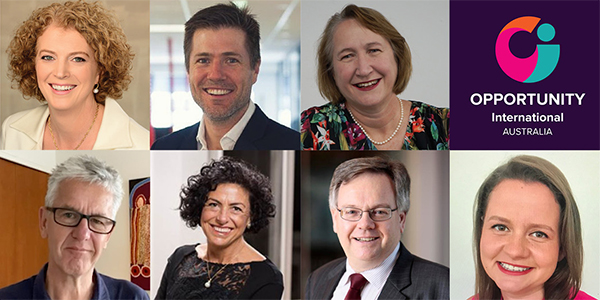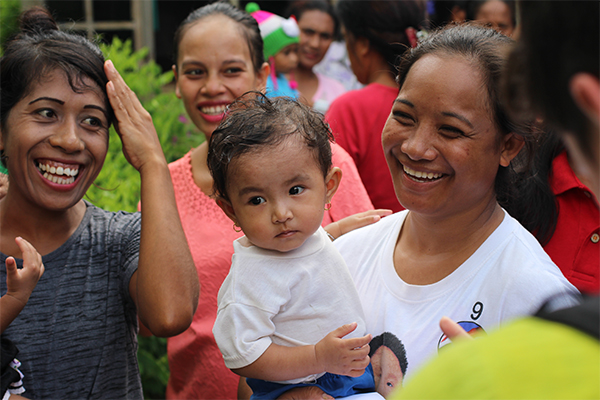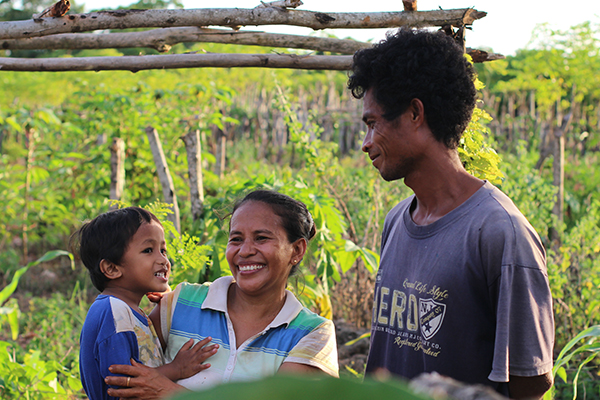Why are you so passionate about Opportunity?

2020 has been a tumultuous year. While the entire world has been touched by COVID-19, those living in poverty have been disproportionately affected and will need significant time and help to recover. We asked our Board why they’re so passionate about Opportunity and why Opportunity is well placed to help so many come through the COVID-19 pandemic.
“I believe in the power of helping women to help themselves.” - Susan Overall
Q: Why are you so passionate about Opportunity?
Joanna White: I’ve seen first-hand, the impact a small loan can make to a woman and her family.
John O’Connor: That ability to transform the lives of people far less fortunate than many of us, is what drives my passion to be involved in all that we do in some very, very poor parts of the world.
Andy Jamieson: Through this organisation, we’re reaching millions of people around the world, giving them a chance to lift themselves out of poverty with just a little bit of support.
Connie Ridley: Opportunity works among the hardworking entrepreneurial poor that want the same things that you and I want: they want to take care of their families, they want to give their kids nutritious food, to educate them, to give them medical care when they’re sick.
Susan Overall: I believe in the power of helping women to help themselves.
Meredith Scott: Opportunity is uniquely placed to provide those who would otherwise not have access to a loan to be able to take that and use it on their business. So that creates the dignity with which they can then create their own pathway out of poverty.
"…it is effective, it’s proven to be effective and will continue to be effective.” - John O’Connor

These women in Holoama, Indonesia are on their way to financial independence after attending a loan group meeting. © Sara Bolst
Q: Why is microfinance such an effective poverty-alleviation intervention?
AJ: Microfinance is so effective because it empowers people, it engages them and gives them the capabilities to build their businesses, provide for their families and their communities for just a very small investment.
JW: A small loan can help [a woman] start a small business; this small business can put food in her children’s bellies and enable them to learn at school; it can provide access to sanitation and medical care. Importantly, it can give her a voice in her family.
CR: [Microfinance] provides an opportunity for them to have dignity as they work the long hours and put the time in to build a sustainable business. It provides a future and a hope for them and their children so that they can begin the work of breaking the cycle of poverty.
Greg Hammond: Small loans which help an individual—usually a woman—start or grow their business give that person dignity and purpose. Their motivation is often to provide a better education for their children.
JO: The recipients—mainly women—develop a sense of self-esteem; they have a purpose in life. And that purpose is through owning and operating a small business to make enough money to do everything that we all want: to provide some security and future for our children. So, it is effective, it’s proven to be effective and will continue to be effective.
MS: It’s empowering to the clients. They are given a loan and once they have those loans, they’re able then to work their own future by creating their own business and creating the income that they want to change their and their children’s destinies.
SO: It’s effective as it gives people the resources to help build their future and pull themselves out of poverty.
“…the world is made better when everybody has an opportunity to participate in economic activity and growth." - Connie Ridley
Q: Why does Opportunity provide additional services in Health, Education and Safety?
AJ: We know that to lift people out of poverty is more than just microfinance because if someone gets sick, they can’t run their business. So, we need to teach them about health, and about education as well.
GH: We know how quickly a business can be affected by health issues. This is not only when there is a pandemic, which is why Opportunity also invests in basic health training and other services to protect communities.
CR: It’s been encouraging to see Opportunity include programs that enhance microfinance: to educate and equip health facilitators, to provide school improvement loans, and school fee loans; to help vulnerable communities understand the ways and methods of human traffickers so they don’t fall prey. These services, together with microfinance, build stronger families and stronger communities. At Opportunity, we believe that the world is made better when everybody has an opportunity to participate in economic activity and growth.
JO: Imagine trying to run a business if you were continually getting sick. Imagine trying to send your children to school if you couldn’t afford it. Or if the schools themselves weren’t able to provide the basic educational needs of the community. Imagine trying to run a business if you were on the receiving end of family and domestic violence – or if your children were. So, at Opportunity we provide not just financial support, but more wholistic support in terms of education, health and safety. The goal is to develop healthy communities: communities in which everyone thrives, the individuals and the communities themselves.
MS: A lack of health, education and safety—including domestic violence and trafficking—can actually pull people who are working their way out of poverty back into poverty once they’ve started their journey out. So it’s really important that we continue to support those people with the proper health education, proper access to education for their children, and prevention of domestic violence and mitigation of sex trafficking, to ensure that our clients have as much chance as they can to work their way out of poverty.
“…we enjoy the luxury of being able to self-isolate – that’s a luxury most people in the developing world don’t have.” - Andy Jamieson
COVID-19 is devastating poor communities around the world. But you can help.
Q: Why should someone support vulnerable families right now amidst COVID-19?
AJ: Right now, with COVID-19, we enjoy the luxury of being able to self-isolate – that’s a luxury most people in the developing world don’t have. They don’t have the space, they don’t have the resource, and they don’t have the capacity to be able to self-isolate the way we are here in the west.
CR: And this is what has been so heartbreaking about the COVID-19 in places where we work with our clients who, if they don’t work that day, they don’t make money to be able to buy food for that day – if they don’t work, they don’t eat.
JO: When you look at the places we operate in, and the people we serve, there’ll be a disproportionate impact from COVID-19 on those very poor communities. Not only that, even more people are forecast to fall below the poverty line. Some estimates have that at up to half a billion people, unwinding much of the work that’s been done to alleviate poverty over the last 30 years or so. There’s probably never been a more critical time to do all that we can to support the most vulnerable in our societies.
MS: COVID-19 has actually created a complete shutdown of the markets [our clients] would normally trade in. And with Level-4 lockdowns being applied in most of the countries that we operate, they have had to work with the food and supplies that they had in their house at the time those lockdowns were announced. That has meant that some of the businesses are no longer viable and there will be a crisis of getting those businesses up and running when COVID lockdowns are suspended.
SO: COVID-19’s impact is being felt globally but it will particularly have an impact on vulnerable communities without savings or reliable income.
“This is about restarting businesses and recreating grassroots economic development.” - Meredith Scott

Heni (middle) works a community garden funded by Opportunity International Australia on Rote Island, Indonesia, which provides her with income to support her family. © Sarah Gray
Q: How will ongoing donor support help families rebuild their lives after COVID-19?
AJ: [Support] needs to continue into the future, so that families, as they get back on their feet, and communities get back together, can continue to build their business and can recover the same way that we want to recover.
JO: Lots of people are trying to speculate about what the new normal will be post-COVID-19. For people who live in poverty, the impact is going to be long-lasting because it is very difficult to change your circumstances and move out of poverty; it’s a gradual process and takes time and effort. The demand for what we offer will continue unabated whenever COVID-19 ends.
MS: This is about restarting businesses and recreating grassroots economic development. So, of our 6.7 million loan clients, that’s 6.7 million small businesses that operate every day in local marketplaces. So the sooner we can get them back up and running, the better – but that will require funding to provide additional relief, and that’s why we need you.
SO: Ongoing support will mean that Opportunity has the resources to enable and empower vulnerable communities to rebuild after COVID-19.
“As you consider the many needs in our society and our world, please help the poor by supporting Opportunity and its vision of a world in which all people have the opportunity to achieve a life free from poverty.” - Greg Hammond
Please help families living in poverty survive COVID-19